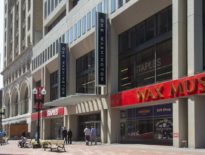
Lawrence’s Ayer Mill clock tower is seen through the gears on a canal sluice gate. Gateway Cities like Lawrence that are within bearable commuting distance of Boston’s core have seen demand for their houses soar as Boston homebuyers seek to avoid the hellish traffic and transit problems gripping the region.
There’s a deep and growing divide among the Bay State’s poorest towns and cities. And the culprit is the usual suspect, a combination of soaring home prices and transportation gridlock.
Old mill towns from Lynn to Framingham to Springfield have struggled for decades to reinvent themselves amid an economy that has gone high-tech and digital. Now some of these Gateway Cities are finally gaining traction, with single-family home prices shooting past highs set more than a decade ago in Lynn and Everett, Framingham and Lowell.
Yet, many other old industrial cities like Fitchburg and Pittsfield are struggling to get back to the starting line, with home prices still below where they were a decade ago. And with the sell-by date on the current real estate boom likely to pass soon, there’s no guarantee they will ever get back.
“With rising interest rates and other signs indicating that the housing-market recovery is slowing, home values in most Gateway Cities remain below 2006 levels,” MassINC noted in its recent report, “Building Communities of Possibility and Promise.”
The Fortunate Few, Close to Boston
Trying to figure why prices are going up in some communities and down in others can be complicated, especially if you are talking about a group of very similar suburban towns or urban neighborhoods.
However, with Gateway Cities, a look at the stats reveals a clear pattern. Home prices in cities and towns within bearable commuting range of Boston have pushed passed pre-Great Recession highs, according to data from The Warren Group, publisher of Banker & Tradesman, in some cases by substantial margins.
In fact, of the older industrial cities within 45 or 50 minutes of Boston, home prices lag behind their previous highs in only one – Taunton.
Framingham, Lawrence, Lowell, Lynn, Everett, Chelsea and Brockton have all posted home price gains – in some cases, substantial ones.
Leading the pack are Framingham and Everett.
Natick, long a popular alternative to Wellesley and other tony suburbs, has seen its median single-family sale price blow past the $600,000 mark. That’s helped push buyers further west into Framingham, where the median price today is $428,450, or nearly 20 percent higher than it was back in 2007, Warren Group data shows.
On the border with Boston, Everett has seen an even bigger increase, with its median home price of $430,000 not only edging out Framingham but representing a more than 30 percent increase over 2007.
It probably also doesn’t hurt that Everett is home to Wynn Resorts’ soon–to–open, $2 billion-plus Encore Boston Harbor casino, one of the largest private construction projects ever in the Boston area.
Other Gateway Cities in the orbit, more or less, of the region’s urban core include: Lowell, where the median single-family sale price is $302,000, up from $250,450 a decade ago; Lawrence, now at $270,000 compared to just under $240,000 in 2007; and Lynn, now at $360,000 compared to $269,000 a decade ago.
This marks a larger shift that has taken place in the past decade in the Greater Boston real estate market.
Desperate to avoid commuter hell on increasingly traffic-clogged highways and unreliable trains, buyers are scrambling to get as close into the urban core as they can.
The communities that make up the Boston area’s urban core saw their collective population surge by 9 percent between 2010 and 2016, compared to a 4.5 percent increase in the exurbs, according to Forbes, citing U.S. Census Bureau statistics.
With prices soaring in once solidly middle-class communities like Natick and Medford once–battered, but now reviving factory towns offer lower prices in locations that in some cases are right on the doorsteps of Boston.
Others Are Outliers in Every Sense
But geography – and the growing transportation gridlock that has made it harder than ever to commute to the jobs hub better known as Greater Boston – has been less than kind to the Gateway Cities of Central and Western Massachusetts.
Transportation data company INRIX named Boston the worst metro area in the country for traffic gridlock in 2018.
We even beat out Los Angeles in this dubious category, with Boston area drivers spending, on average, 164 hours caught in traffic last year.
A decade ago, commuting into Boston or Cambridge from Leominster or New Bedford might have seemed doable, if not ideal, to some buyers.
But fewer are making that tradeoff, which may not be so surprising given it can now take 45 minutes just to go 12 miles down the Massachusetts Turnpike from Natick to Newton.
New Bedford and Leominster are still more than $10,000 below their 2007 highs of $239,500 and $263,500. Fitchburg has yet to get back to its 2007 median single-family sale price of $202,000.
Towns and cities even farther away from New England’s urban hub, like Chicopee or Westfield, have an even harder time of it.
The one exception is Springfield, whose median single-family sale price is $160,500, up $10,500 from 2007.

Scott Van Voorhis
However, given the billions of public and private investments that have been pumped into city over the past decade, including the new, nearly $1 billion MGM resort casino, this is a very modest return, indeed.
We can’t very well load these old Gateway Cities onto a flatbed tractor–trailer and send them down the Pike so they can be closer to Boston.
Clearly a sweeping and massive overhaul of our traffic–clogged highways and consistently unreliable public transit system is needed.
Otherwise the emerging Gateway City gap, between the haves and have nots, the Everetts and the Fitchburgs, will only grow greater and more desperate.
Scott Van Voorhis is Banker & Tradesman’s columnist; opinions expressed are his own. He may be reached at sbvanvoorhis@hotmail.com.




 |
| 
